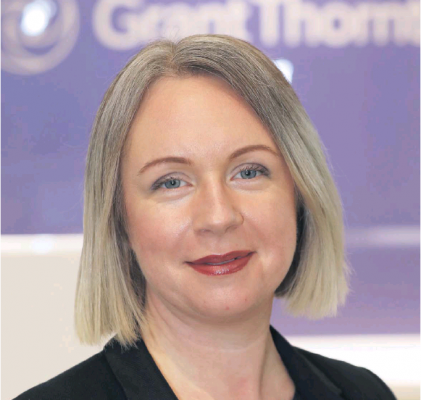The post: Head of Employer Solutions, Grant Thornton
The post holder: Jane Lee
An enquiring mind and attention to detail are crucial for Jane Lee’s role as a tax advisor.
Give a brief outline of your career to date.
I started my career at Merrill Lynch (now Bank of America) in Dublin and London, working as an Equity Swaps Analyst for a trading desk. I then qualified as a Chartered Tax Adviser in 2005, and most recently moved to Grant Thornton in May 2017.
What was your favourite subject at school?
My favourite subject in school was art.
Did you go on to further/ higher education, if so what did you study and where?
I studied economics and maths in Trinity College Dublin.
How did you get into your area of work?
In Merrill Lynch we traded in foreign equity swaps that had tax advantages arising from various double taxation agreements and this is where my interest in tax began.
Is this what you always wanted to do?
I actually wanted to be a ballet dancer and had a scholarship lined up to train in London but studying economics and maths was definitely going to provide me with more job opportunities.
Were there any essential qualifications or experience needed?
In tax, the devil is often in the detail, so having an enquiring mind and a determination to fully understand what is happening is essential. The other essential skill is getting to know your clients, their businesses, and their plans for the future. We can understand all the tax legislation in the world but if we don’t understand our clients, that knowledge is useless.
Are there alternative routes into the job?
There are no requirements to have a degree to start training in tax and you can start to train with the Association of Taxation Technicians straight after school. Businesses are open to taking graduates with varied backgrounds; it doesn’t have to be a finance-based degree.
What are the main personal skills your job requires?
Our clients and their advisers have to trust us which we achieve through the Grant Thornton culture that embodies the firm’s key values: integrity, fun, grounded, passionate and collaborative. These form the platform from which we develop the personal skills that set us apart from other players in this arena.
What does a typical day entail?
Employer Solutions is becoming a more defined strategy for businesses and there is no typical day as a tax adviser in this area. As part of a growing all-Ireland team, I work daily with clients on wide-ranging cross-border tax queries.
Every business has challenges attracting and retaining talent, so I also work with clients to develop equity and financial reward plans for their employees.
HMRC is also focused on employer compliance and we see an increasing number of PAYE compliance checks. I help businesses to ensure they are meeting all their employment tax obligations. New rules are coming for businesses that engage with personal service companies, so I am busy helping clients prepare.
Finally, I oversee a lot of tax due diligence work for investors, delving into a business’ tax compliance history to identify and quantify any tax risks and consider a solution that suits both the purchaser and the seller.
What are the best and most challenging aspects of the job?
The best aspect of this job is the variety of engagements we undertake. I get to meet and help lots of innovative passionate employers and businesses who have amazing visions for future growth.
The challenges lie in the changing shape of digital technology and HMRC’s advancements in this area. As we embrace these changes, I am part of a working tax group exploring our digital analytical capabilities and how we can move forward with new solutions.
Why is what you do important?
It’s important because we help businesses grow and flourish and at the same time keep them on the right side of HMRC. Tax legislation and guidance get more complex and when we know there are significant changes ahead, it’s imperative our clients get the best advice possible.
What advice would you give anyone looking to follow a similar career path?
Try and gain experience across as many different tax functions as possible. A key skill for any tax adviser is understanding not just the tax implications of your area of expertise but how other taxes may interact.
We frequently get employment tax and residency queries on an employee working in another tax jurisdiction. Aside from the complex tax implications for the employee and employer, there may be a larger tax issue for the business depending on the role of the employee and this creates potential corporate tax and VAT issues in a foreign jurisdiction.
If you weren’t doing this what would you like to do?
It would come down to either starring in a musical (if I ever learn to sing properly) or becoming a TV chef!
If you could go back, what is the one piece of advice you would give to yourself on your first day?
Always believe in yourself and your abilities and if you work with people who don’t, then you need a change. Don’t be afraid to bring your personality to the table; this is what will make you stand out.
Describe your ideal day off.
An early morning cycle followed by a compulsory bacon and soda brunch. Afternoon would be a journey down to the Mournes with my four boys. A trip to the cinema later that night would complete it.
What is the key to a successful job search?
Firstly – build up an extensive network and don’t be afraid to make contact with key individuals in this network. LinkedIn is fast becoming first choice for businesses in their search for talent so a profile on this media source is essential.


